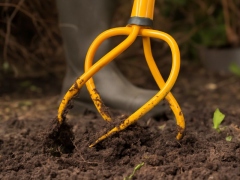- Carry a knife and a flashlight at all times
Even if your leaving the camp just for five minutes. You got mesmerized by a pretty bird, went a few steps too far in a wrong direction and here you are - sun is setting and you have no idea where your tent is.
- Do not make camp close to water
There are known cases when water level in a river has risen overnight and washed away a camp. Try to make sure that there are no dry trees or twigs above or near the tent, since in windy weather these might fall on the tent. It is not advisable to make camp on animal paths, which animals regularly use to get to water. If you see a path in grass leading up to the water - choose another place to make camp. Otherwise you might meet a moose.
- Do not start a wood fire
Dig a deep hole for fire and start your campfire in it. This will protect your campfire from wind and ensure that fire does not spread to nearest bushes.
- Avoid animal remains
Do not make camp in areas where animals have their meals. For example, if you see fish bones and remains on a river bank it means that this is a place where a bear eats.
- Search for dry firewood
Usually, logs that are laying on the ground are soaked with water. Break dry twigs, look for broken dry twigs hanging on trees, etc. Pines at the base of the trunk have small dry twigs that serve as a perfect kindling. Experienced hikers call it "powder".
- Take a paper map and a compass
Batteries die fast and woods are not a city where you have electricity on every corner. A paper map of the area will always be handy.
- Do not eat what you do not know
If you are not an expert botanist avoid experimenting with plants and mushrooms. Eat only what you recognize and are sure in for 100%. You wish to add some diversity to your menu you can add a pine twig to your tea for taste.
- Always check your water supply
Take note of the the buildings that you passed on the banks. If these buildings are farms, do not take water downstream since it will definitely contain fertilizer.

